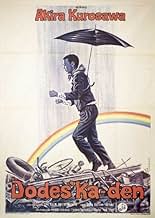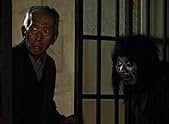अपनी भाषा में प्लॉट जोड़ेंVarious tales in the lives of Tokyo slum dwellers, including a mentally deficient young man obsessed with driving his own commuter trolley.Various tales in the lives of Tokyo slum dwellers, including a mentally deficient young man obsessed with driving his own commuter trolley.Various tales in the lives of Tokyo slum dwellers, including a mentally deficient young man obsessed with driving his own commuter trolley.
- 1 ऑस्कर के लिए नामांकित
- 4 जीत और कुल 1 नामांकन
फ़ीचर्ड समीक्षाएं
The plus point of this film against LD is that each character has their own arc so we can solely focus on the person matter without interruption from other characters; in LD everyone tells their stories in the same room which can be quite confusing at times. The minus point is that there seem to be a less clearer picture of the daily, mundane activities by the slum residents to carry on with their lives, aside from the scenes where the little boy begs for leftover foods. Overall, this is a very well-made movie that still put many modern movies of similar theme to shame.
The title comes from the sound a mentally retarded boy makes as he imagines he is operating a train. We slowly get to know more of the people in the small community, the two drunks who trade wives because they are not happy with the ones they have. The old man who is the center of the town who helps out a burglar that tries to rob him. The very poor father and son that cannot ever afford a house, so they imagine one up of their own. By the end of the film, the stories all come full circle, some turn out happy, others sad.
Since this was Kurosawa's first color film you can see that he uses it to his advantage and it shows. Maybe too much. This movie goes in many different directions and it's hard to settle down and get into it. But don't get me wrong, Dodes' Ka-Den may not be Kurosawa's best, but coming from the greatest director of all time, it's much better than 99% of today's films.
What startles first is the absence of Toshiro Mifune (he wouldn't collaborate with Kurosawa again) and Takashi Shimura and all the stacked actors we were familiar with. All new faces: from the gentle husband with nervous mannerisms and his bullying wife to the elderly wise man who helps a burglar and gives a depressed man faith in life, from the father of five children who rumor says aren't his own to the Greek chorus of women doing laundry and gossiping about the mysteriously catatonic but oddly handsome artist, from the lively prostitutes to the drunkards who swap wives and philosophical comments on life... so many hidden depths revealing no less hidden depths about human nature.
The second shock is the departure from the black-and-white, Kurosawa was a painter deep inside so he doesn't take colors for granted and uses them to paint a rich palette of characters living in Japanese suburban slums, that and a certain personal vision combined with their own visions at times in pure expressionist tradition. It's surprising how we're drawn into these people by inhabiting their own world, starting with the 'local idiot' who spends the whole film mimicking both a trolley and a conductor, using the Japanese clickety-sound of "Dodes'kaden".
Once again, the line between lunatic is genius is thin: we get it that the boy is challenged but there's an interesting shift between the opening sequence showing his drawings of trolleys, all in rich and bright colors so typical of childhood, but relatively motionless. Once the kid starts to embrace his own poetry and gets his "trolley" ready, with a body language that evokes both Chaplin (for the gentleness) and Keaton (for the precision), the camera moves, faster and faster, we're taken to his ride and the film starts to drain the energy that will come at hand to understand the other players.
Yes, it's childish, weird and rudimentary but we're taken within that creative weirdness as if cinema was an art that called for such daringness and maybe Kurosawa is preparing us to something unusual like Bergman did with his "Persona". And like Bergman's film, the film opens with a mother-and-son moment, a prayer so "mechanical" that suggests the birth of cinema as an expresion that couldn't just rely on meditative and contemplative format but on sound and words. By the way, the first time I saw the film, I was immediately caught by that trolley Candide and going to the kitchen to get my dinner, I was repeating "dodes'kaden", that was almost 9 years ago but it was one of the two images that stuck to my mind.
The other image was pretty horrifying, I remembered a man and his kid with horrible greenish faces and a sort of nightmarish psychedelic imagery, the flipside of the uplifting and joyful spirit of our trolley friend. The father spends time dreaming with his kid about the house they'll built, he's a poet, looks like one, his vision of the big house is shown like some sort of imagery with a Hollywood score that kind of sets he distance with the Americanized version of poverty despite his Chaplinian roots, what awaits the kid is perhaps the most disturbing aspect of the film, that and the father whose traits gets maligned by gross lighting and outrageous make-up of color if he went maybe too far into his own imagery. When he got too close, I covered my eyes.
So the parallel between the poet father and the trolley kid is interesting, both try to drives themselves away from misery, one went too far he alienated himself (looked even like an alien) and one drove in a circular way getting back to the starting point, ironically preventing himself from delusion and giving a meaning to his life even within the realm of meaninglessness. Maybe there's the idea that in places where things don't move and are meaninglessness, only dreams can allow you to move as if in motion lied the meaning. The film starts with the trolley guy being trapped by many corridors and rectangular frames before finding his "freedom" outside. The kid and his father lived outside but that lack of commitment to a local emphasized their dream so much that it destroyed them.
"Dodes'kaden" is an assemblage of little slices of life that seem rather circular and motionless but together they create a whole of themselves where we feel like life is an eternal struggle between reality and the imagination. The kids' drawings are the convergence between both, how a simple trolley can look so colorful and motionless but so existent when we follow it through the kid's mime, that's the merit of the the local idiot who like the titular "Idiot" in 1951, shines a light on "normal" people. It's possibly because of Kurosawa's own sense of exaggeration that he could allow humanism implode from his portrayal of men whose life didn't go anywhere, apart from forging a sense of reality that could be compatible with their dreams.
It's just as if Kurosawa shows both the merit and the limit of escapism as if he was himself aware of the chances he was taking by making this film, whose failure lead to a suicide attempt, so you better believe the filmmaker who had proved the world so much had still to prove to himself. Perfectionist as always and humanistic, that goes without saying, so the film might disorient some new or old fans, cast-wise and style-wise, but if not his best, it's certainly his richest and deepest film.
And here ends my 1600th IMDb review.
क्या आपको पता है
- ट्रिवियाThe movie was made as the first feature of the Committee of the Four Knights, a group founded by four of Japan's greatest directors: Akira Kurosawa, Keisuke Kinoshita, Masaki Kobayashi and Kon Ichikawa. According to a interview with Ichikawa, they wanted their first picture to be a hit. When this film told a story deemed too depressing and was subsequently a failure with audiences, the group disbanded and never made another film. The movie's failure also contributed to Kurosawa's suicide attempt one year later.
- भाव
Beggar: Our house ought to be built on a hill. We Japanese used to build houses in valleys and mountain coves. We've always preferred the lowlands.
Beggar's Son: That's true. I saw pictures of foreign countries. They have their houses in high places, but ours are in low places.
Beggar: There's a reason for that. There are many earthquakes and typhoons in Japan. Wooden houses in high places are easily shaken by earthquakes and typhoons. So they chose the lowlands to avoid the danger. But that's not the only reason.
Beggar: [continues] The Japanese prefer soft light to bright sunshine. We like shady places. We like to live in the midst of nature. So we couldn't get used to concrete houses.
Beggar's Son: That's right. I don't like concrete houses either. They're too cold for me.
Beggar: But we shouldn't forget one thing. It's true that wooden houses suit the Japanese people. But we mustn't cling to our culture and characteristics if we become weak and lose endurance as a result. By living in houses made of stone, iron, and concrete, foreigners have strengthened their characters and capabilities. Now we're building our own house. We must take our future into consideration. We must think of you, your children, and your grandchildren.
Beggar's Son: Yes, that's true.
- कनेक्शनFeatured in 62nd Annual Academy Awards (1990)
टॉप पसंद
- How long is Dodes'ka-den?Alexa द्वारा संचालित
विवरण
बॉक्स ऑफ़िस
- दुनिया भर में सकल
- $981
- चलने की अवधि2 घंटे 20 मिनट
- रंग
- पक्ष अनुपात
- 1.37 : 1
इस पेज में योगदान दें





























